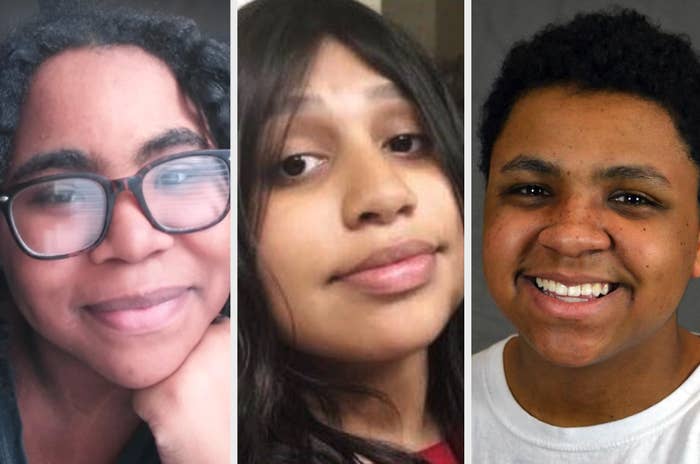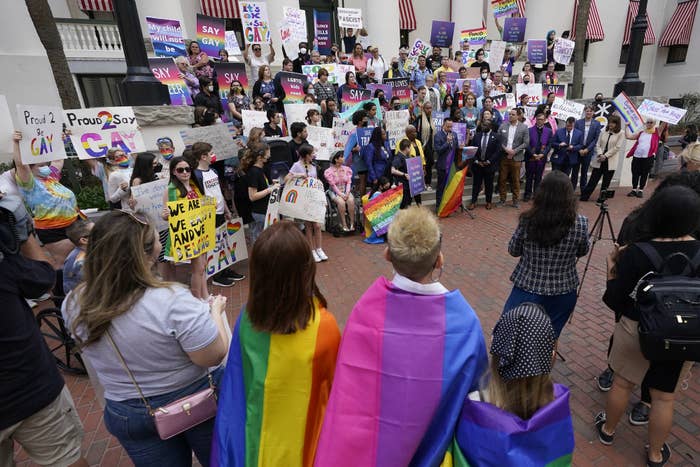
Erin Robinson is scared.
The 17-year-old nonbinary student attends a high school in Montgomery, Alabama, where the Republican governor this month signed a law that makes it a felony for parents and doctors to provide transgender youth with gender-affirming care, like puberty blockers. Another new Alabama law prohibits trans kids from using the bathroom that corresponds with their gender identity and bans any conversation about sexual orientation or gender identity in elementary schools.
“My GSA has been going crazy over this,” Robinson said, referring to the student club known as a Gay–Straight or Gender-Sexuality Alliance. “For me personally, this has been such a devastating moment. It's just taking away my rights, my bodily autonomy. It's making someone else choose what happens to my body, and I'm definitely not OK with that.”
But Alabama is not unique. In state houses across the US, right-wing lawmakers have attacked LGBTQ rights in recent months with a speed, ferocity, and ugliness that have astonished their opponents. Relying on a winning political strategy that focuses on classrooms and schools in order to spread fear, copycat laws have sprung up in Florida, South Dakota, Texas, Utah, Iowa, and Arizona.
“I'm pretty scared not just for Alabama,” Robinson said, “but for the entire country.”
Robinson is one of more than 15,000 students across the US who signed to participate in a Day of Silence organized by GLSEN, a national group advocating for LGBTQ students. On Friday, Robinson and others will either refrain from speaking throughout the day or hold scheduled moments of silence (depending on what their school might allow) in order to draw attention to the discrimination they experience both from their peers and from politicians.
“I’m going to be silent and not talk,” said Esperanza Orozco Vargas, a 17-year-old trans girl who attends high school near Tacoma, Washington. “It's to show solidarity with LGBT students that get bullied and harassed at school and get called names because of the fact that they’re LGBT.”
For some, the silence will be a time to reflect or mourn. For others, it’s an act of defiant protest symbolizing the oppression against LGBTQ students. But it will end with loud calls to action, where students will attend either in-person or online rallies and commit to fighting for their rights, said Tyler Vazquez, an 18-year-old nonbinary and transgender senior in Albany, New York.
“Although we are taking silence, we're taking silence on our own behalf and reclaiming that,” said Vazquez, who like Robinson and Orozco Varga is a member of GLSEN’s National Student Council.
“We're not taking silence as if we're just doing what the Florida legislation wants us to do,” Vazquez said, referring to that state’s so-called don’t say gay law. “We're taking silence on our own behalf and then we're going to speak up after that.”

The protest has even caught the attention of Congress. On Thursday, California Rep. Mark Takano introduced a resolution to formally establish April 22 as a National Day of Silence that highlights discrimination against LGBTQ students.
Takano noted GLSEN’s Day of Silence campaign has existed since the mid-1990s, but said there was “a particular urgency in its message today” due to the recent wave of legislation.
“To all the LGBTQ+ young people out there, I hope this day reminds you that you are not alone — there are thousands of people standing with you across the country. You have a right to live as your authentic self without fear,” Takano said in a statement.
The fears for LGBTQ young people have been very real, according to Rob Todaro, senior communications manager for the Trevor Project. Crisis counselors at the LGBTQ youth suicide prevention nonprofit have been fielding more calls recently from countless students battling stress, anxiety, and fear about the laws.
“We have been hearing from LGBTQ young people, especially transgender and nonbinary young people, who are scared and worried about this record wave of anti-LGBTQ legislation, most of which specifically targets trans youth,” Todaro said.
A January poll of 820 LGBTQ young Americans conducted by the Trevor Project and Morning Consult found that 85% of transgender and nonbinary youth — and two-thirds of all LGBTQ young people — had suffered negative mental health impacts due to debates over state laws restricting their rights.
“This has been an incredibly difficult year on top of at least two very difficult years for the LGBTQ community and the world,” Todaro said. “But it has been very inspiring to see LGBTQ students, either speaking out or taking a vow of silence to really claim power in a space where they're being told that they need to be silent and to not be proud of who they are.”
The three students who spoke with BuzzFeed News said they hope their symbolic protest can spread among their peers and on social media in order to highlight their plight.
“The main takeaway from the protest is that the silence is deafening,” Orozco Vargas said. “This is supposed to demonstrate that we go through a lot, and this is to show you that we're being ignored.”
